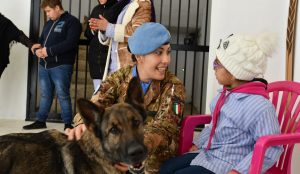A team of UNIFIL’s Italian and Malaysian peacekeepers partnered with a local youth group recently in organizing an intense month-long educational therapy treatment programme for children with learning disabilities in the Al Bassma Center in the village of Qana in south-western Lebanon.
Composed of UNIFIL peacekeepers with occupational therapy, special education and psychological skills as well as dogs, this programme provided arts and animal-assisted therapy for children and adolescents with disabilities.
Working with local organizations and partners that offer services to children with disabilities has been part of UNIFIL’s Sector West priorities to better serve their host communities, as part of their Civil-Military Cooperation (CIMIC) activities.
For Maj. Emanuela Scuderi, an Italian peacekeeper and the manager of this programme, working together with local partners and encouraging local actors to ensure that persons with disabilities enjoy equal access to basic services is extremely important and was the main goal of this project.
“The aim of this project is to better understand the needs of children with disabilities working together with the Al Bassma Center,” she said. “We are helping them build their psychosocial skills so they can improve their relationship with the outside world, so this programme does benefit their community as a whole and in that sense, it is an investment for sustainable peace.”
As a UNIFIL Sector West Gender Advisor, she also believes this type of programmes are great for the future of these children who are the most vulnerable part of the population. “We have used some of our most specific assets like psychologists and psychomotor support specialists, and we are also working with dogs,” she added.
Maj. Scuderi emphasized that programmes like this one can give these children the keys to unlock their full potential.
Lieutenant Chiara Moriglia, another Italian peacekeeper and a psychologist, said that animals have been an important part of mental health care settings for decades and their service has provided a variety of resources for occupational therapy practitioners about using animal assisted therapy in practice.
“Pet-facilitated psychosocial therapies and most specially, the use of dogs in the case of this programme, can help children with disabilities to reduce their level of anxiety, depression and also helps them to better manage their emotions.”
Pet therapy, more precisely with dogs, has helped out at hospitals, schools, emergency situations and disasters sites with people and children with learning difficulties and developments disabilities.
Eto is a UNIFIL mine detection peacekeeper dog that has been trained to behave well in these psychotherapist sessions. His dog handler, Sgt. Maj. Andrea Guidi, who is also a UNIFIL Italian peacekeeper, guided him well during the interaction with the children.
“Eto was very good with the children with physical, psychological and communication impairments at all times.” he explained.
Sgt. Maj. Guidi has witnessed “significant” improvements since the beginning of this programme.
“At first, it was very difficult for the kids to just see the dogs, but later on, they were all able to walk with them with the leash, pet them, giving them biscuits and brushing their fur,” he said. “When the children have struggles like depression, anxiety or sadness, Eto cheers up a kid in a positive way and it is immediate. Kids with struggles seek him out purposefully.”
A teacher at Al-Bassma Center, Iman Kourani, acknowledged the importance of this programme. “Many children and people with disabilities and special needs sometimes are not able to express their feelings,” she stated. “But with this activity, they have improved their social and learning skills significantly.”
Building capacity and knowledge on the rights of persons with disabilities among peacekeepers and peacebuilding actors, and empowering persons with disabilities in conflict and post-conflict situations is one of the main goals of UN Security Council Resolution 2475 adopted on 2019, which urges Member States to take all appropriate measures to eliminate discrimination and marginalization of persons on the basis of disability.
According to the World Health Organization, over a billion people, which is about 15 per cent of the world’s population, have some form of disability.
Source: https://unifil.unmissions.org/employing-dogs-unifil-peacekeepers-help-children-learning-disabilities



